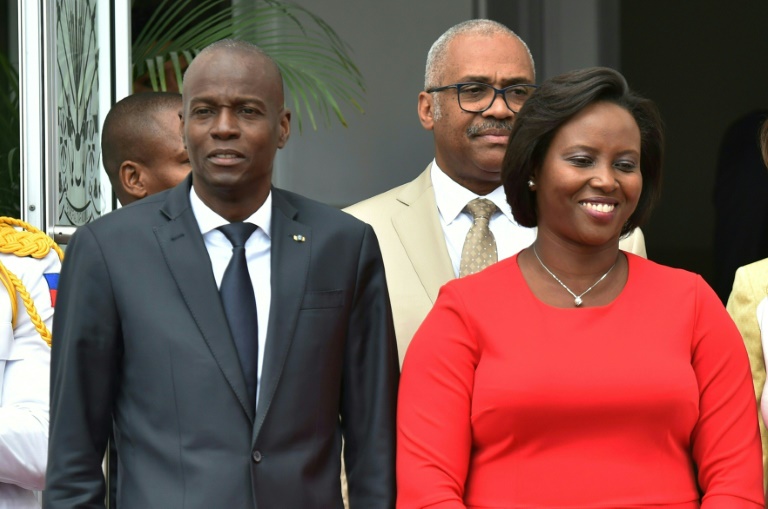The widow of slain Haitian leader Jovenel Moise, who was critically wounded in the attack that claimed his life, on Saturday issued her first public remarks since the assault, calling on the nation not to “lose its way.”
Martine Moise’s comments came three days after she was airlifted to a Miami hospital for treatment of grave wounds suffered early Wednesday when gunmen stormed the family home in the Haitian capital Port-au-Prince.
They also come as the impoverished Caribbean nation reels from the slaying of its leader, with no clear succession plan on the horizon.
“I am alive, thanks to God,” Martine Moise said in an audio message in Creole that was posted on her official Twitter account, and verified as authentic to AFP by Haiti’s minister of culture and communications, Pradel Henriquez.
“In the blink of an eye, the mercenaries entered my home and riddled my husband with bullets … without even giving him a chance to say a word,” she said.
According to Haitian authorities, a hit squad of 28 men — 26 Colombians, many of them retired soldiers, and two Haitian-Americans — burst in and opened fire on the couple in their home.
So far, 17 have been arrested, and at least three were killed. A handful remain at large, police say.
But no motive has been made public, and questions are swirling about who might have masterminded the audacious assassination.
Martine Moise pointed at a variety of possible reasons: saying the killers could have been sent by people who might have been displeased with her husband’s plans to provide “roads, water and electricity, a (constitutional) referendum and elections set for the end of the year.”
She suggested that perhaps those behind the killing “do not want to see a transition in the country.”
“I am crying, it is true, but we cannot let the country lose its way,” she said. “We cannot let his blood… have been spilled in vain.”
– No clear path forward –
Moise’s assassination has plunged already troubled Haiti — the poorest country in the Americas — into chaos.
Amid deep uncertainty over its political future, the international community has called on the impoverished Caribbean country to go ahead with presidential and legislative elections slated for later this year.
As for a transition of power, interim Prime Minister Claude Joseph says he is still in charge.
But a group of senators, with the backing of several opposition groups, have endorsed a plan to install Senate leader Joseph Lambert as the provisional president, with Ariel Henry — who had been appointed by Moise earlier this week — as the new prime minister.
It is not clear how Lambert could move ahead with his plan.
And for now, Joseph seems to have the police and other security forces on his side.
“The constitution is clear: I have to organize elections and actually pass the power to someone else who is elected,” Joseph said in an interview broadcast Saturday on CNN.
US officials say Port-au-Prince has asked Washington for “security and investigative assistance,” and FBI agents have already been dispatched but a Haitian minister said troops were also requested. A senior US administration official has told US media that troops are off the table.
In Port-au-Prince, businesses slowly reopened and people returned to the streets of the capital on Saturday.
But at the US embassy in the suburbs, more than 200 people worried about the country’s uncertain future gathered in hopes of asking for political asylum, their passports and other documents in hand, though generally, people must be on US soil to make such a request.
“If the president can be assassinated here, I — a simple citizen — won’t be spared. I have to ask for asylum, to seek a better life elsewhere,” Louis Limage told AFP outside the guarded building.
As for Martine Moise, she promised to engage with Haitians via Facebook “in the near future.”
“I will not abandon you,” she said.










